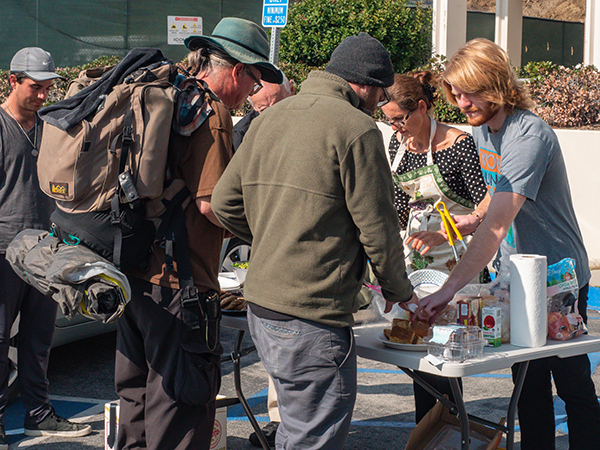
Energy, warmth, rays, comfort, summer.
Those are some of the words that come to mind when Pepperdine students think about the sun.
In Malibu, California, a vast majority of the days are sunny. Pepperdine’s campus offers frequent sunshine that has many benefits to students, like giving them energy and boosting their moods.
“I love the way that the sun turns things from dark to light,” said Katie Price, junior sports medicine major. “It lights up the world. It lights up people’s lives.”
However, there are risks that come with too much sun, like skin cancer, and too little sun, like Vitamin D deficiency, which students need to consider.
Students have to balance these benefits and risks, as they enjoy activities in the sun while also protecting themselves.
Benefits of sunshine
The sun is energy and necessary for all life.
“The chief benefit of sunshine is that it guards against the likelihood of being depressed,” said Lawrence Palinkas, professor of Social Policy and Health at University of Southern California.
From a mental health standpoint, Palinkas said there is no point where the sun stops being beneficial. He encourages people to make a routine of receiving daily sunlight, especially during the winter months.
“Exposure to light, typically sunlight, is critical to our functioning as humans,” Palinkas said.
Exposure to light influences many biological functions of the human body, Palinkas said. Sunlight is the most influential factor that regulates people’s circadian rhythms. Circadian rhythms regulate human sleep cycle and energy levels, according to the CDC
Lindsey Smith, a first-year nutritional science major, said she is grateful and aware of how the sun sets her circadian rhythm. It is important to her to leave her windows open at night, so that she wakes up to the sun’s light.
“I feel much more energized when I wake up with the sun,” Smith said.
Smith also pointed out other benefits of the sun, like overall improving mood, sustaining energy levels, setting hunger signals, helping one destress, boosting serotonin and regulating hormones. She believes people often ignore the health benefits of regular exposure to sunlight.
“Sunlight exposure is definitely overlooked when it comes to chronic illnesses such as depression, anxiety, sleep apnea, stress,” Smith said.
Too much sunshine
The No. 1 concern of too much sunshine is skin cancer, especially at Pepperdine, where the sun is out almost every day.
“Skin cancer is the most common cancer in the U.S.,” Lucy Larson, medical director at the Pepperdine Student Health Center, wrote in an email.
Larson wrote that UV protection is essential year-round to protect students from the threat of skin cancer.
For Price, skin cancer is a major concern because her mother, who is a Pepperdine alum, got skin cancer.
“She actually would go to the beach all the time and wouldn’t wear sunscreen and she did get skin cancer, so that is her fear that I am going to do the same thing,” Price said.
Skin cancer is not the only risk of too much sunshine.
Hope Min, a first-year business administration major, said she is concerned about getting sun spots and age spots from too much sun exposure.
Nick Barron, junior business administration major, said he worries about getting really bad sunburns because there have been times that he has been negligent with applying sunscreen in the past.

Hope Min, first-year business administration major (left), and Clara Taggart, first-year accounting major (right), walking to class on a sunny Malibu day (Photo by Bailey Johnson).
Protection from the sun
However, there are ways to protect oneself from the sun to limit these risks, like applying sunscreen and being cautious about the amount of time in the sun, according to the CDC.
“Malibu’s frequent sunshine can be a benefit without raising skin cancer risk if individuals take the proper precautions to protect their skin from the sun,” Larson wrote.
Sun protection is important, not just in Malibu, not just in the summer, but everywhere all the time.
Min takes her sun protection very seriously. She applies SPF 30 sunscreen daily.
“I love my sunscreen,” Min said. “I can’t leave without sunscreen.”
Smith also makes sure to put on SPF 30 sunscreen every day. She puts sunscreen on her face daily and will apply additional sunscreen if she is in the sun for long periods of time.
Smith also protects herself by being cautious about when she spends time in the sun. She tries to stay out of the sun as much as possible between noon and 4 p.m.
“During those peak hours there would be more potential for the harmful risks that come with sunlight exposure,” Smith said.
Her favorite times of the day to be in the sun are early in the mornings, within 30 minutes of waking up, and in the evenings, just before the sun sets.
Price thinks that sun protection is important, but said she does not think about protecting herself every day. She mostly thinks about putting on sunscreen when she knows that she will be outside for long periods of time, like at the beach or at soccer games. Price is from Mobile, Alabama. She has found that it is easier to protect herself from the sun at home, compared to at school, because of her parents’ influence.
“When I am at home, just because I am with my parents, it is less on me because they are like ‘Did you put sunscreen on?’ but then in college it is more on you,” Price said.
Min has found the opposite. She protects herself more from the sun in college than at home, San Jose, California, because in Malibu she thinks about the sun more. In high school, she would put sunscreen on her face everyday, but now she also puts sunscreen anywhere that would be exposed to the sun.
Not enough sunshine
Without enough sun exposure, people’s skin will not be able to naturally make enough Vitamin D, which is important for bone health, Larson wrote.
Smith takes a Vitamin D supplement because in the past she has been low, but she is a big supporter of people getting direct sunlight so that their skin naturally makes Vitamin D.
“Sunlight exposure cannot be replaced with a supplement,” Smith said. “If you are low then it is beneficial to supplement, but you can’t just base everything off of the fact that you are getting this Vitamin D supplement.”
On average, people only need five to 15 minutes of sun exposure two to three times a week to produce enough Vitamin D, according to the World Health Organization.
Also if someone does not get enough sun exposure, then their serotonin levels can drop, Larson wrote. Serotonin is a neurotransmitter that regulates a person’s mood.
While studies have only looked at serotonin changes due to diminished sunlight over a longer period of time, Price noticed a difference in her mood after spending 10 days without sun exposure in COVID quarantine.
“As someone who is an extravert, I thought that not seeing people was going to be the hardest part,” Price said. “But truly it was the mental thing of knowing that my body had not been in the sun in over a week.”
Price’s quarantine experience showed her that she took the sunshine for granted.
Barron was never in quarantine. However, he did notice that he spent less time in the sun at the start of the pandemic with the stay-at-home orders.
“It just made it feel like a lot of gloomy days,” Barron said. “Even though it was sunny outside, I did not get to enjoy it.”
The pandemic created a very similar situation of isolation and confinement to that of the winter blues, Palinkas said. Palinkas has done research on Seasonal Affective Disorder and winter blues.
Seasonal Affective Disorder is a psychiatric condition that causes episodes of depression during the winter months when there is the least amount of light, according to the American Psychiatric Association. Lack of sunlight can cause consistent, intense symptoms of winter blues.
Barron said he notices the difference in his mood when the sun is out. He feels more energized to spend time outside and is overall more thankful.
Price also said the sunshine improves her mood and fills her with joy. She tries to be a joyful person who radiates kindness to those around her, which she finds is easier to do when it is sunny.
“It’s easier to radiate light when I am receiving light, like genuinely from the sun,” Price said.
Bailey Johnson completed the reporting for this story in Jour 241 under the supervision of Dr. Christina Littlefield and Dr. Theresa de los Santos. Dr. Littlefield supervised the web version of the story.



